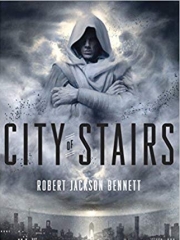City of Stairs by Robert Jackson Bennett
For all the hype around sophisticated recommendation engines out there, I still find most consumer-facing suggestions completely useless. Part of the problem is that these engines don’t know what to optimize for. Sometimes I want something similar, sometimes I want something totally different. In my opinion, rating-based recommendations don’t work at all. People synthesize too many dimensions into one rating – realistically only one of three options: 3/4/5 stars. So then we could consider other features, but it’s really tough to boil things down to features. For example, all books have a feel to them that’s quite impossible to get until you actually start reading. So, we don’t know the optimization function and we don’t know the input variables.
All this has meant that I’ve had to rely on other means to find new books. One of the most effective ways is the most old fashioned – going to a bookstore. Somehow, no one has been able to replicate or improve on just standing in front of a bookcase and browsing. This time, I used another strategy: r/books. City of Stairs was the July pick for the Reddit book club. I did some due diligence and decided to go for it.
1) “‘This is not as things were; thus this is not how things should be'” – Mulaghesh
I’ve started to interpret every plot line with any modicum of social commentary through the lens of 2018 American politics. My major takeaway is that the themes have been, are, and will always be the same.
2) “I try not to think at all when outdoors, dear. It tends to ruin things so.” – Vohannes
I think about completely different things when I’m inside vs outside. Maybe this is why walking 1:1s feel so weird – I’m talking about things that I generally only think about indoors.
3) “It is so terribly, unbearably rude for him to pass through all these years and come out the same person on the other side.”
Why is there stigma with people not changing and also stigma with people changing?
4) “‘The Restorationists look to the past, Saypur wishes to maintain the present, but no one considers the future.'” – Vohannes
Humans on aggregate probably spend too much energy on the past.
5) “What a pleasant thing it would be to be a knife, always eager to take the path of least resistance, always drawn to the weak points, falling through tendons and skin and rinds like a blade of grass swept downstream.”
I’d read a book where every chapter is from a different object’s perspective.
6) “‘Coffee refreshes the body. Tea refreshes the soul.'” – Shara
Fake news, but funny.
7) “States are not, in my opinion, composed of structures supporting privilege. Rather, they are composed of structures denying it – in other words, deciding who is not invited to the table.”
The absence of something that has never been there is hard to detect.
8) “Ear of Jukov: an engraved, stone door frame that contains no door. Iron wheels on the base. Speculated that it has a twin, and no matter where the other Ear is, if the doors are operated in the correct manner one can pass through one and come out the other.”
Did they pay royalties to Doreamon?
9) “Photography is a relatively new innovation, less than five years old, but she can already tell she will hate it.”
I was very confused throughout about when this story took place. Some things were “modern”, some weren’t.
10) “Shara now sits on committees that decide who shall be nominated to be committee chairs for other committees; then, after these meetings, she sits on committee meetings to formulate agendas for future meetings; and after these, she attends committee meetings deciding who shall be appointed to appoint appointments to committees.”
Too real, too painful.
Overall, I enjoyed City of Stairs. Unfortunately, since I was borrowing from the SF library and the waitlist was super long, I had to take a two-week break in the middle. That might have contributed to me feeling that the tone of the book was somewhat disjointed. Sometimes, it seemed very serious. Other times, it tried to be funny. For example, I realized halfway in that Mulaghesh was there solely for comic relief. Also, the introductions of some plot points – like the Divinities and Sigrud’s background – were clunky. But the story had enough magic and character to make it a satisfying read.
